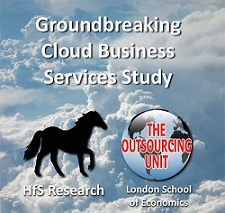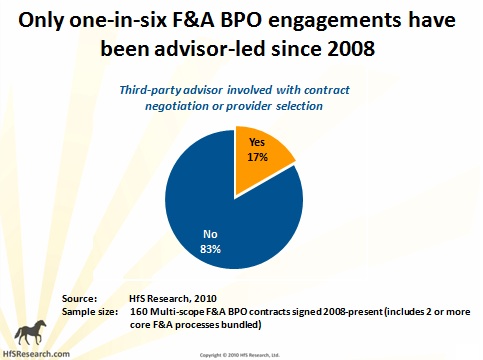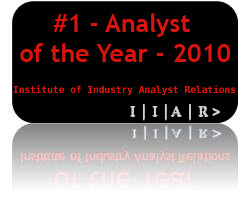Month: December 2010
Best of HfS in 2010
As the world prepares to shut down, recharge its batteries and anticipate a frenetic 2011, we take a look back at the highlights of 2010, as seen by your friends at HfS ResearchRead More
Real-estate Ron runs the rule on REFMO
Sourcing professionals should be very interested in REFMO because it is the second or third largest spend category of any company. Only recently has there been an opportunity to integrate the function. EquaTerra's Ron Walker talks to HfS Research to explain more...Read More
Congratulations Esteban!
We are pleased to announce the promotion of Esteban Herrera to the role of Chief Operating Officer for HfS Research. His vast experience advising sourcing customers, combined with his energy, enthusiasm, sense of humor and entrepreneurship will make him a popular pundit and analyst for HfS readers.Read More
Cloud is changing the future of outsourcing: 1000 organizations have spoken
Gone are the days when CIOs demanded their shareholders underpin massive technology investments in ERP and infrastructure. Those investments have been made, and most CEOs intend never again to make capital outlays of that ilk on technology. Enter the Cloud. This is driving a new inflection point in the provisioning of business services, that goes far beyond straightforward outsourcing.Read More
HfS Podcast: 2011 Outsourcing Predictions
Join us as HfS Research discusses our predictions for 2011.Read More
Is TPI’s Index reflecting the real BPO industry picture?
As a result of TPI's recent Q3 outlook, several industry colleagues expressed concern that TPI wasn't reflecting market reality, with particular reference to their claim that the BPO industry had taken a 15% nose-dive in 2010. New HfS Research data that encompasses all current Finance & Accounting (F&A) BPO engagements, reveals two key factors that cause us to question the reliability of the latest TPI Index's BPO outlook.Read More
Humbled, honored and embarassed!
Phil Fersht has been voted analyst of the year by 150 analyst relations professionals at the Institute of Industry Analyst RelationsRead More
And here are… HfS’ 2011 Outsourcing Predictions… on demand
nd here we are, like clockwork, jumping on the tackiest, lamest marketing exercise every analyst, consultant, CEO, and wannabe thought-leader always persists in doing... because you are supposed to gasp "Wow - they are predicting the future!"Read More
Announcing the “HfS 25″… where the industry’s premier sourcing leaders are gathering
Today, we're delighted to announce the official unveiling of the "HfS 25" - a collecti0n of 25 sourcing leaders that will work behind closed doors with us to help define our industry, the like of which hasn't been done before. HfS Research is pulling together experiences from the leading minds who live and breathe sourcing everyday. And what surprised us, when we reached out to sourcing leaders in the HfS network, was the sheer enthusiasm with which they wanted to be part of this group - they want to get out and network, share ideas, meet peers in other organization, and add their tuppence to the future direction our industry is taking.Read More
The Industry Speaks about Cloud, Part IV: Business leaders demand business transformation support – can providers gear-up to help?
Business users want to accelerate to Cloud Business Services while IT wants to mitigate its many risks. We reach an impasse with both business and IT looking for external support to make their move to Cloud Business Services a reality, and the different type of support both sides want point towards a profound reorganization around Cloud.Read More














